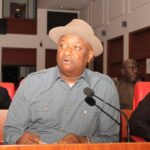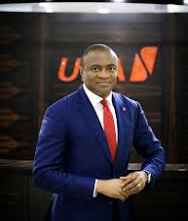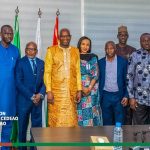Nigeria’s current GDP growth rate may not meet the projected $1 trillion economy target by 2030 without significant double digit GDP growth, Oliver Alawuba, Group Managing Director of United Bank for Africa (UBA), has said.
Mr. Alawuba gave the hint Monday in Abuja, at the ongoing 36th edition of Finance Correspondents and Business Editors Association of Nigeria Seminar, with the theme: ‘Playing the global game: Banking Recapitalization Towards a $1 Trillion Economy’ organised by the Central Bank of Nigeria (CBN).
He emphasized the need for institutional frameworks and government support banks to invest in critical infrastructure that would foster accelerated growth of the Nigerian economy.
Alawuba also criticized the 50% Cash Reserve Ratio (CRR) as unsustainable for economic growth and urged its reduction as inflation rates decline.
He highlighted the importance of security, financial inclusivity, and addressing infrastructure deficits in roads, ports, and power, stressing the need for tax incentives and a shift from a primary to a secondary economy to drive growth.
“We need institutional framework, government support to be able to invest in infrastructure, others to support the economy.
“50 per cent CRR is not sustainable, if we are going to talk about growth of the economy. You can’t be talking about 50 per cent CRR and I am happy that the inflation is responding to the actions of CBN, so as the inflation rate comes down we expect the CRR to come down” he said.
During his opening remarks, the 2025 Chairman of the Seminar, Prof. Ken Ife, Chief Economic Strategist, ECOWAS Commission, highlighted the looming global economic challenges and their potential impact on Nigeria.
He emphasized that the global trading system, established post-WWII, is facing significant stress due to rising protectionism and trade tensions. Ife noted that President Trump’s policies, including tariffs, could lead to inefficiency and increased unemployment, affecting both export and import-dependent jobs.
In Nigeria, Ife stressed the need for economic resilience, particularly in the face of a potential global economic “tsunami.” He emphasized the importance of fiscal and monetary policy coordination to mitigate these challenges.
Additionally, Ife highlighted Nigeria’s banking sector’s need for recapitalization to address emerging economic pressures.
He declared that Central Bank faces impending pressure on foreign reserves, urging patience as the institution navigates these challenges.
“You are going to be having pressure on our reserves. So please bear with Central Bank, because it’s going to be on the receiving end” he added.
In his remarks, CBN Director of Banking Supervision, Dr. Olubukola Akinwumi, emphasized that the apex bank is implementing policies to enhance investment in the economy, particularly within the banking sector. The recapitalization drive aims to promote consolidation and innovation in the sector.
Akinwumi stressed that the CBN is committed to combating illicit financial flows and will not admit unverified funds into the banking system, stressing that the bank will conduct thorough verification of all incoming funds to ensure transparency and security.
He declared that the CBN has outlined flexible avenues for banks to raise capital, including initial public offerings, rights issues, private placements, mergers, and acquisitions. Banks can also opt to scale down their operations, for example, from international to national banks.












